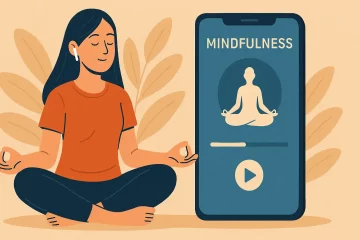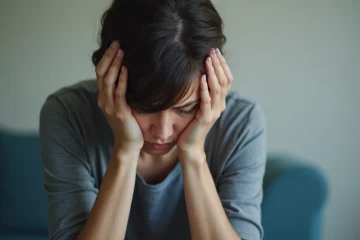Success at school, being productive at work, having good conversations, and our general well-being are all directly connected to how well we can focus on one task and not think about things that distract us.
Loss of concentration is often seen as a personal weakness or laziness, but in fact it is a sign that there are deeper problems related to our lifestyle and habits.
On the way to improving concentration, it is important to understand that it is not a quality you are born with and it can be changed, because it is a skill you can develop and make stronger. The way to make it better begins when you understand how to improve focus and concentration.

The Endless Cycle: Not Enough Sleep, Addiction to Gadgets, and Losing Focus
Not Enough Sleep
Sleeping is not just resting for your body, but it is a process for how your brain works, because during sleep, especially in the deep and fast sleep phases, many important things happen:
- Making memories stronger: The information you get during the day is processed and structured, and then it is moved from your short-term memory to your long-term memory, and without enough sleep this process is broken, which leads to problems with remembering and learning.
- Cleaning the brain: The brain actively cleans itself of waste products, including toxic proteins that grow during the day, and if this process is broken, it makes you feel like you have “brain fog,” when thinking becomes slow and unclear.
- Controlling your mood: Not enough sleep directly affects the amygdala, which is the center for fear and worry, so it makes us more irritable and emotionally unstable, and this makes it hard to concentrate because our inner emotions are not stable.
When you do not get enough sleep, your brain works in a mode that saves energy, and it turns off functions that are not as important, including the ones that are responsible for stable attention and concentration, so you get distracted easily, do not pay attention to details, and make more mistakes.
Addiction to Gadgets
The screens on our smartphones, tablets, and computers are a very big part of our life, but they are also a main reason for our distraction, and the reason for this addiction is simple but smart:
- Dopamine loop: Every notification, every new like, message, or interesting video causes a small increase in dopamine, which is the hormone of pleasure, so our brain quickly gets used to these “small rewards” and starts looking for them all the time.
As a result, we constantly reach for our phones to get a new dose of dopamine.
- Broken focus: Social networks, news feeds, and video services are made to hold our attention for as long as possible, so they make us switch between short, fast-changing pieces of information, and this way of working makes our brain used to constantly changing tasks and makes it unable to do deep, long focus.
We lose the ability to do “deep work,” which is a state when we are completely focused on one difficult task.
The combination of not enough sleep and digital addiction creates a perfect situation for chronic distraction to develop, and when your brain is tired from not sleeping enough, it becomes even more likely to be affected by the endless distracting signals from our gadgets.
How to Know if You Have Problems with Concentration?
| Sign | Description |
| Problems starting tasks | You wait a long time before you do important things that need mental work, and you start working but quickly find a reason to stop, like checking your email or social media |
| Getting distracted often | You cannot work for even 10 to 15 minutes without stopping, because any sound, notification, or thought instantly changes what you are thinking about |
| Feeling tired in your head | You feel tired in your head even if you have not done anything difficult, and you think that any new task is a big challenge that makes you feel exhausted |
| Problems remembering things | You forget what you just read or what a person just said in a conversation, and you have to read parts of a text many times because your brain does not remember the information |
| Losing your things | You are always looking for your keys, phone, glasses, or other things because you were not paying attention when you put them somewhere |
| Problems talking with people | It is hard for you to listen to a person talk without stopping them and thinking about your own things, and you miss important details |
| Procrastination | You wait to do important things until later because you do not have the energy to concentrate, and instead, you do easy and simple things that do not need effort |
Exercises and Tips to Improve Focus
Mindfulness Techniques and Meditation
Meditation teaches you to control your attention and bring it back to the present moment when it starts to wander.
- Breathing meditation (5 minutes): Sit in a comfortable position and close your eyes, then focus only on your breathing, feeling how the air goes in through your nose and out through your mouth, and when your thoughts start to distract you, just notice it and gently, without judging yourself, bring your attention back to your breathing.
- Body scan (10 minutes): Lie down or sit comfortably, and then move your attention to each part of your body, starting with your toes and ending with the top of your head, noticing all the feelings like warmth, cold, or pressure, and this exercise teaches mindfulness and helps you to feel present.
Brain Exercises
- Reading books: Reading long, difficult texts on paper (not on a screen) makes your brain hold its attention for a long time.
- Learning something new: Try to learn a new skill, like a music instrument, a different language, or drawing, because this creates new connections in your brain and trains your brain to work actively.
- Summarizing: After reading an article or a book, try to say the main points out loud or write them down, because this helps your memory and teaches you how to find the most important things.
Tips for a Digital Detox
- Turn off notifications: This is the most simple but most powerful step, because most notifications are not urgent.
- Set “no phone time”: Choose certain hours in the day, like the first hour after you wake up and the last hour before you go to sleep, when your phone will not be near you.
- Grayscale mode — black and white: Turn on this mode on your smartphone, and without bright colors, apps and feeds become less attractive and you will want to use them less.
- Use timers: Apps that track the time you spend on your phone will help you understand how big the problem is and control yourself.

Organizing Your Work Space and Time
- The Pomodoro Technique: Work with focus for 25 minutes, and then take a 5-minute break, and after four of these cycles, take a long break for 20 to 30 minutes, because this technique breaks big tasks into parts you can manage and helps you not feel tired in your head.
- “Golden hours”: Find the time during the day when you are most productive and save it for the most important and difficult tasks, and during these hours, do not get distracted by anything.
- The one-task rule: Do not try to do many things at the same time, because multitasking is a myth, and it only makes your work worse and makes it take longer to finish.
- Remove extra things: Take all the things off your desk that can distract you, and do not let yourself open browser tabs that are not related to your work.
Improving Your Sleep Habits
- Follow a schedule: Go to bed and wake up at the same time every day, even on weekends.
- Do not use gadgets before bed: The blue light from screens stops your body from making melatonin, which is the sleep hormone, so you should not use screens for an hour before you go to bed.
- Create a ritual: Drink herbal tea, take a warm bath, or read a book, because this will help your brain get ready for sleep.
Physical Activity and Food
- Regular exercise: Even a 20-minute walk can greatly improve your concentration, because physical activity increases blood flow to the brain and helps your body make a protein called BDNF, which makes new brain cells grow.
- Good food: Eat foods that are good for your brain, like fatty acids from Omega-3, antioxidants, and B vitamins, and do not eat things that make your blood sugar go up and down quickly, because this makes your mental activity go down.
Conclusion
Start with small things: get better sleep, use your gadgets less, and do small but regular exercises to train your attention. Remember that every time you consciously bring your mind back to a task, you make it stronger.
This process needs patience and discipline, but the results will be much better than you expect, because your attention is the most valuable resource you have, and the better you can control it, the better and more productive your life will be.

